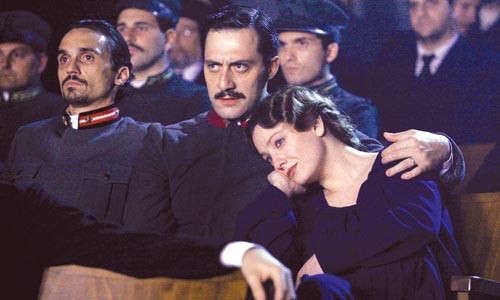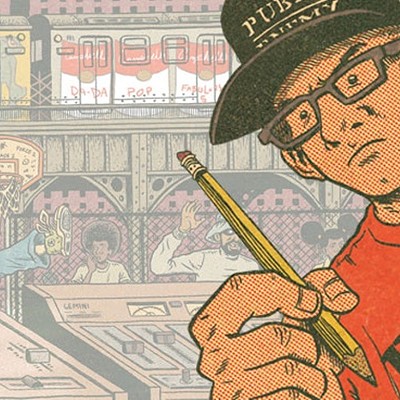In opera, the emotions are big, loud and frequent. That's also been true of the dramatic tenor of Italian cinema for the past 40 years or so, since Fellini stopped making intimate films, and started throwing parties that he invited his actor friends and us to attend and witness. There have been plenty of post-Fellini Italian screen gems, and some notable filmmakers, but more often than not, there's been a certain tendency toward bombast.
Marco Bellocchio's Vincere ("Win") begins as a drama about the rise of Benito Mussolini (Filippo Timi), the socialist-turned-fascist who led Italy down a revolutionary road to ruin. Long before he became Il Duce (which does not, I was astonished to learn, translate as "the douchebag"), he had a wife, Ida Dalser (Giovanna Mezzogiorno), and a son, also named Benito. He loved them both very much, dousing the boy with kisses when he had to leave, and demanding them in return.
Or so Ida claimed, some years later, in the absence of a marriage certificate, or anyone to confirm her story. For in the years after they met, something happened: history, you could say, or perhaps, as Mussolini puts it, "Luck goes past every man's door once. You have to open the door." In his case, luck came in the form of World War I, which he vehemently opposed as an anti-monarchist, but which he embraced when he realized it could benefit his cause. He's wounded badly in battle, and in the hospital, the King visits his bedside and salutes him. Soon he's a fascist, then president of the country, and then -- well, you know the rest.
Unfortunately, it's all a little too soon. It's hard to tell exactly what Bellocchio is up to for a half hour or so in Vincere, but slowly, his film dissolves into a cinematic opera of judicious excess. At first he uses black-and-white archival footage to transition between his dramatic passages, as if to show the frenzy of history versus the quietude of the Mussolini we never knew (quote unquote). But soon the drama becomes as frenzied as the images from real life.
When the newly powerful Mussolini marries the woman who nursed him back to health, Ida does all she can to stalk him and harass him for abandoning her and his child. She writes to the government and to the pope, all to no avail. Then, during one of his public appearances, she tries an assault -- and ends up in a mental hospital, where she more or less spends the rest of her life, trying to convince people she's not insane for believing herself to be Mrs. Mussolini.
The overblown soundtrack of Vincere features throbbing symphonies worthy of an opera, and Bellocchio literally throws things at us on the screen -- words with exclamation points, little animated flying formations of planes or marching soldiers. It's unnecessary, and it detracts from the more interesting psychological core of his film.
I suspect Vincere may resonate more with Italian audiences, who certainly have strong feelings about their dead dangling leader. For Americans, though, it's all a bit puzzling and obscure. (Pardon me for seeming cold, but rejecting his wife and kid is one of the lesser indiscretions of Mussolini's life.) The film's most effective moments come during Ida's institutionalization, where we see how thoroughly Mussolini has mesmerized both her and his desperate people. A woman asks Ida, "How does Il Duce screw?" and when Ida shouts out the window for help, some boys chant adulations to their magnificent dictator.
Vincere opens with promise: Speaking to a hostile crowd, the young Mussolini bravely defends some anti-religious statements for which he's just taken criticism. "I challenge God," he says, placing a borrowed watch on a table. "I give him five minutes to strike me dead." Then, for five minutes, silence, and he tells his audience, "Time's up. God doesn't exist." In light of what Mussolini ultimately did with his life, he makes a point that's hard to argue with. If only God had opened His door that day, He might have welcomed the Italian people's moment of good luck. In Italian, with subtitles.

Starts Fri., May 21. Harris Theater














